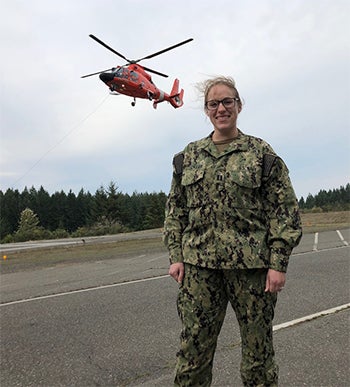Celebrating ArentFox Schiff’s Veterans: Rebekkah Stoeckler on Going From Military Service to Client Service
Rebekkah Stoeckler, Lieutenant, US Navy Reserve
 Upon graduating from the US Merchant Marine Academy (USMMA) in 2014, Rebekkah earned her commission and joined the US Navy Reserve, beginning her military career as an Ensign. She currently holds the rank of Lieutenant and continues to serve in the Navy Reserves.
Upon graduating from the US Merchant Marine Academy (USMMA) in 2014, Rebekkah earned her commission and joined the US Navy Reserve, beginning her military career as an Ensign. She currently holds the rank of Lieutenant and continues to serve in the Navy Reserves.
Why did you choose to serve in the military?
I chose to attend the USMMA, one of the five federal service academies, aspiring to follow in my father’s footsteps and become a merchant mariner. The USMMA not only educates and graduates merchant mariners but also serves as a commissioning source for the naval reserve and other military branches. With a family history of service across various military branches, I witnessed firsthand the discipline, resilience, and strong character my father, uncles, and grandparents developed during their service. Their experiences, courage, and the supportive communities they built, even after retirement or separation, inspired and motivated me to pursue a military career.
Describe your roles and experiences in the uniformed service.
Throughout my uniformed service, I primarily focused on providing domestic shoreside support for both submarine and surface commands. As a Strategic Sealift Officer (SSO), my responsibilities included offering maritime expertise and advice to military commanders and civilian authorities, enhancing the readiness and capability of the Ready Reserve Force, and serving as a liaison between the Military Sealift Command and surface and submarine commands.
And as a civilian mariner.
My background as a civilian mariner laid the foundation for the knowledge and skills I contributed to the Navy. In my civilian capacity, I navigated vessels through the Intracoastal Waterway, Mississippi River, Illinois River, and Tennessee River. Additionally, I worked on civilian cargo ships, embarking on routes spanning the globe.
What was your experience as a woman in the military? What lessons or advice can you share?
In 1974, the USMMA became the first service academy to admit women. Still, in 2014, my graduating class was comprised of less than 20% women. As a naval officer and civilian mariner, I often found myself being the only woman in the room or on the vessel. In these moments, it would have been easy to feel out of place or intimidated.
Fortunately, I was mentored by some of the first women to graduate from the USMMA and sail on merchant vessels. They encouraged me to speak confidently and not be afraid to take up space. Beyond their mentorship, simply witnessing these women in positions of senior leadership in the military and on merchant vessels showed me what was possible in my own career.
In an era when the military and maritime industry were hostile and resistant to women, my mentors persevered and shaped the world I inhabit today. I am deeply grateful for the trailblazing women in the military and the legal industry. As Billie Jean King said, “if you can see it, you can be it.”
How did deployment impact you? What do you remember most?
My experience as a merchant mariner and SSO taught me to excel under pressure and communicate effectively in challenging situations.
These experiences honed my leadership skills and provided valuable lessons through the challenges I encountered. Memorable moments with my shipmates and crew often emerged after overcoming demanding situations, leading me to appreciate the personal growth and camaraderie that arise from adversity.
What made you pivot to a legal career?
Following my years of service in the military and developing my skills as a mariner, I felt eager to explore new avenues for personal and professional growth. I have always been passionate about devising innovative solutions to complex problems. The legal field offers a platform to apply my unique perspective and skills in addressing our clients’ diverse challenges, making it a fulfilling and gratifying career choice.